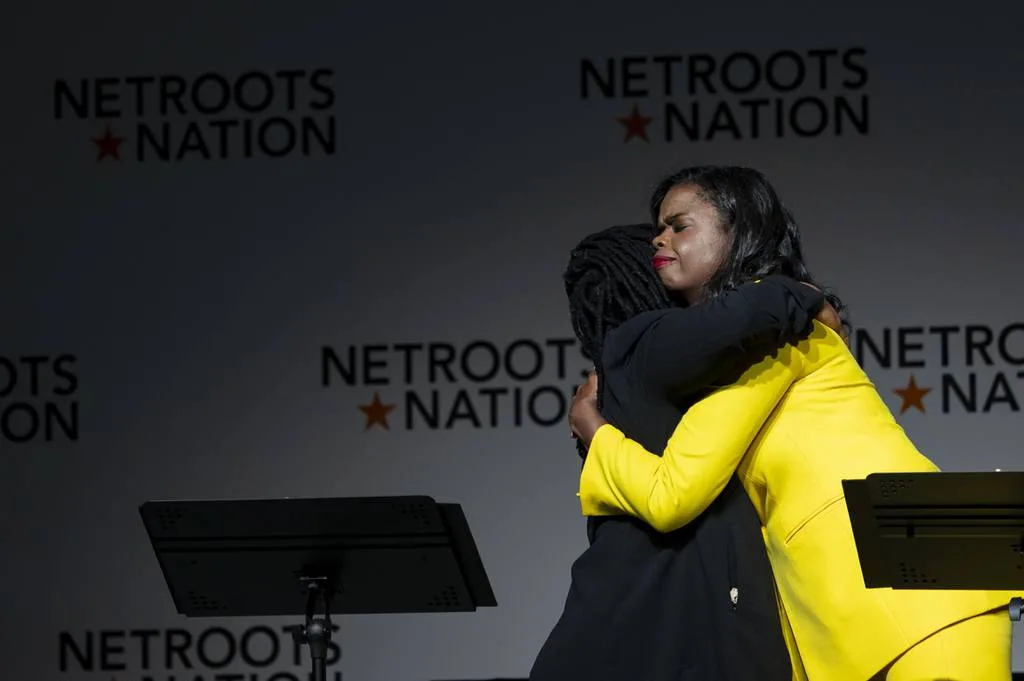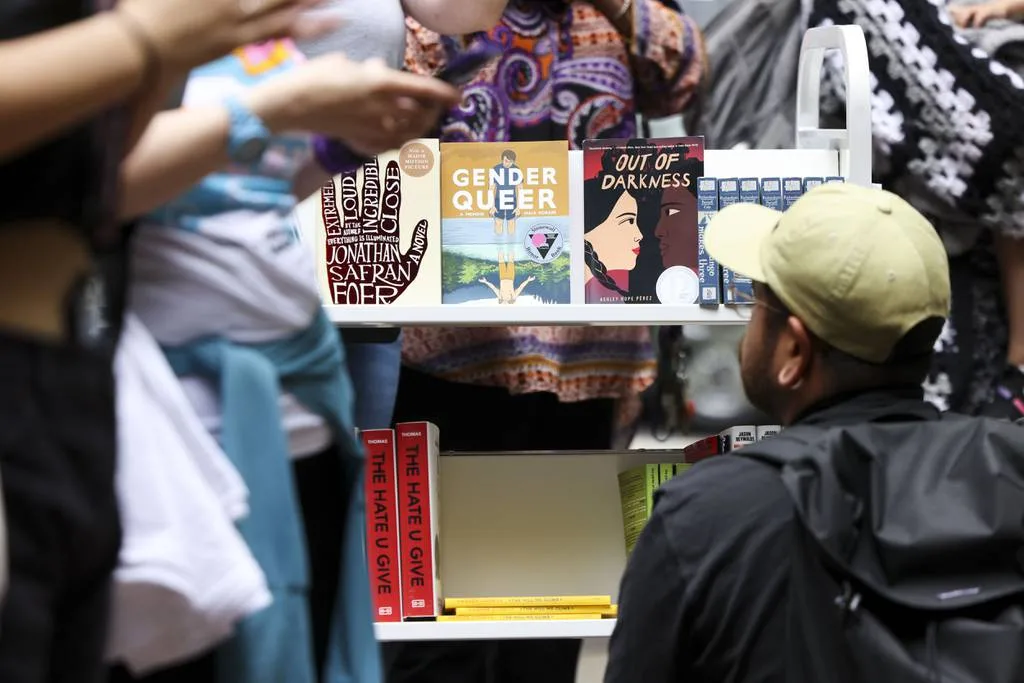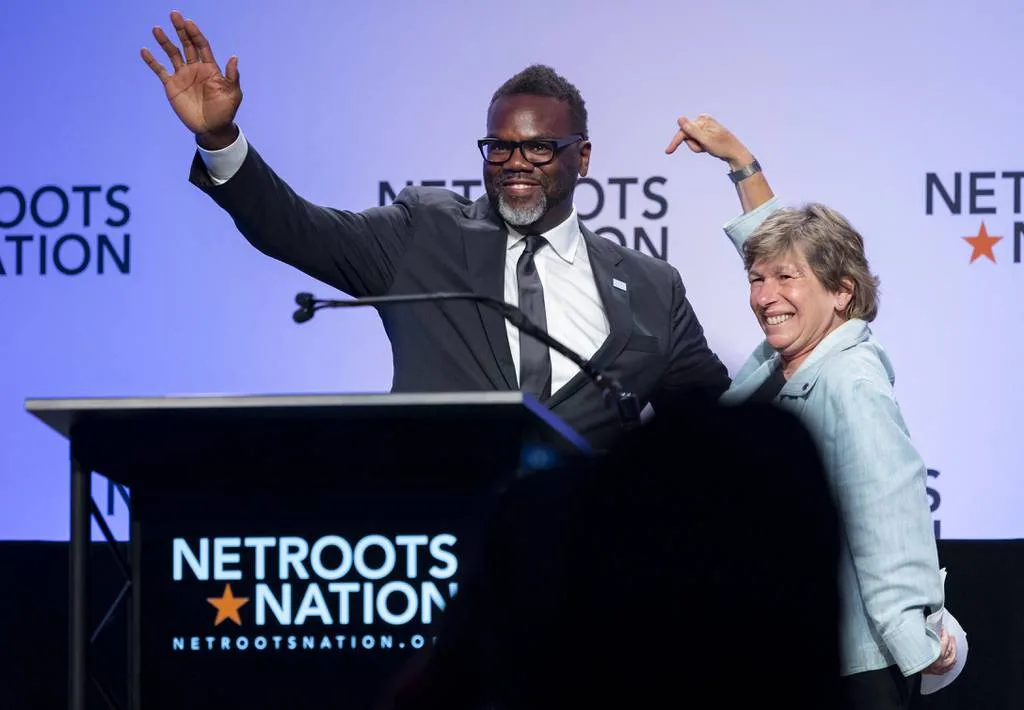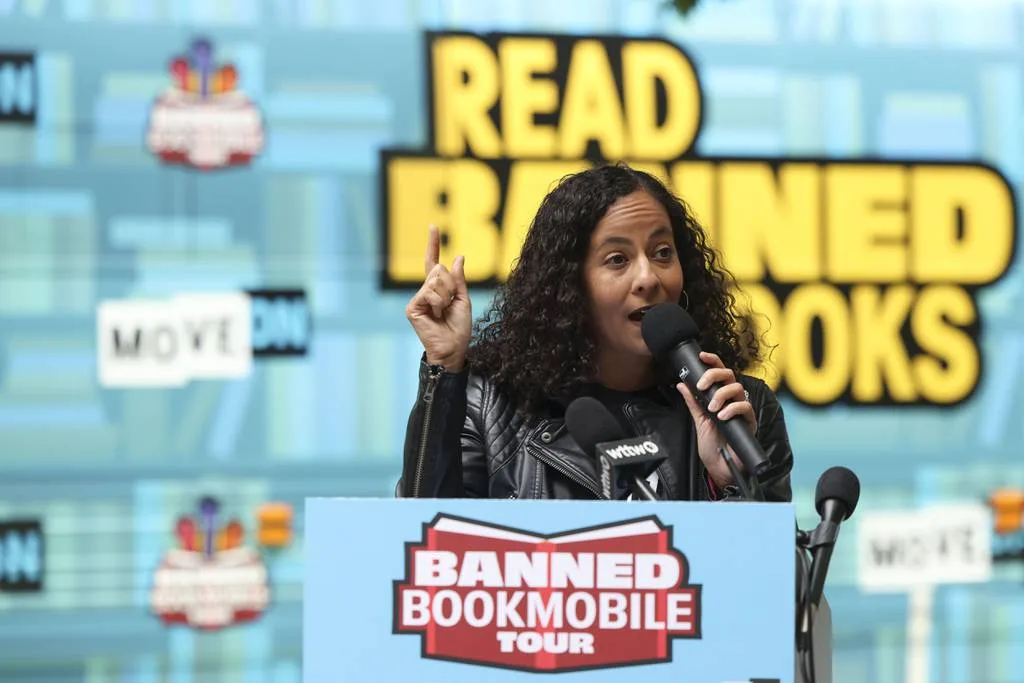Brandon Johnson’s election as mayor and Illinois’ enactment of liberalized social policies under Gov. J.B. Pritzker served as rallying points for the three-day Netroots Nation conference, the largest national gathering of progressives and a precursor to next year’s Democratic National Convention in Chicago.
More than 3,000 activists and group leaders registered for the conference, which ended Saturday, with speakers including Johnson, Democratic U.S. Reps. Pramila Jayapal of Washington, Ilhan Omar of Minnesota and Illinois’ Jan Schakowsky, Jesús “Chuy” García and Delia Ramirez.
Outgoing Cook County State’s Attorney Kim Foxx was featured and performed a reading with author Colette Payne, director of the Women’s Justice Institute Reclamation Project, about the impact the criminal justice system had on Payne and her family. Noting the criminal justice system’s racial bias, Payne detailed how she was arrested in her youth for stealing and then turned to drugs while she received little attention or help from authorities.

“Every policy decision that has really made people mad at Kim Foxx was rooted in Colette Payne’s story,” Foxx said. “I recognize America has a problem and it’s not Colette Payne, but the systems put in place to hold you back.”
Inside and around the Chicago Hilton on South Michigan Avenue where the conference was being hosted, more than 150 panels, training sessions and events ranged from the tour launch of a “banned bookmobile” to sessions on restorative justice, climate change, coalition building, combating disinformation, voting rights, U.S. foreign policy and the Pentagon budget — all interspersed with daily morning yoga and noontime meditation.
“Netroots is really about invigorating the progressive base in the progressive heart of America and all of us coming together to strategize for how we safeguard and renovate our democracy so that it truly works for everybody. And it’s a really important hallmark of activism in the United States,” said Rahna Epting, executive director of MoveOn Political Action, the political arm of the digital tech organization for progressive candidates and causes.
“So this is us getting together to repower ourselves for what’s ahead, specifically for the 2024 election where we know there’s so much at stake — not just issues we care about like climate, health care, gun violence prevention but also whether or not we’re going to have a free and fair democracy so that we can have an arena where we can test ideas and pass laws that really protect all of us,” she said.
Epting spoke at a park in Printers Row, just a few blocks from the hotel, where she was joined by the leaders of the nation’s two major teachers unions to launch a multistate bus tour featuring giveaways of books that have been banned by various government authorities across the nation. The tour is scheduled to end in the Florida capital of Tallahassee as a symbol against Republican presidential candidate and Gov. Ron DeSantis,who has supported laws curbing the availability of books dealing with race and LGBTQ issues in public libraries and schools.




For MoveOn and Netroots, and their “digital fixation” on communicating and organizing, it would appear “kind of antithetical” to talk about printed books, joked Randi Weingarten, president of the American Federation of Teachers, whose locals include the Chicago Teachers Union.
“But progressives understand on a gut level that banning books is the first step of limiting freedom — and that banning books in schools is that step,” Weingarten said.
She accused DeSantis and the followers of former President Donald Trump of fearmongering.
“The fear is directed at people who are really concerned that their way of life has now been challenged,” she said. “The battle we have is a battle of do we have a joint future where we’re all in it together?”
For Weingarten, Netroots also was a way to honor Johnson, a former middle school teacher and CTU organizer, for his mayoral victory. Johnson was the keynote speaker on the convention’s inaugural day and Weingarten introduced him, saying, “Chicago is a town that’s going to show the world what the future should be like.”
Johnson said that while the city faces many challenges, “there are forces that are working hard every single day” to promote a negative narrative about Chicago.
“In fact, those forces want to define and characterize the city of Chicago as this violent, unstable city,” Johnson said. “The way they characterize this city, these forces that are working hard to disrupt our movement, they want you to believe that you cannot walk freely in the city and experience the wealth, the vitality and the vibrancy of the city of Chicago
“I just think that it’s important that we know that the narrative that they want to push for the city of Chicago, if they’re successful, that’s the narrative that they want to push all over the country. And we’re not going to stand for it in the city of Chicago and we’re not going to stand for it anywhere.”




Johnson said his mayoral victory was a demonstration for progressives that “this multicultural, intergenerational movement has propelled us into this moment where we don’t have to shrink and we don’t have to hide from our values. We can actually run on our principles and values and win.”
State Sen. Robert Peters of Chicago said state laws involving criminal justice, abortion and gay rights and climate change enacted under Pritzker’s tenure serve as a demonstration of what “progressive power and the progressive movement can do” even while some derisively refer to Illinois as part of the nation’s “flyover country.”
When state and national Republicans last year attacked Democrats over a new law creating cashless bail for nonviolent offenses, Peters said Democrats “stood firm with the progressive movement and defended our majority.” The so-called SAFE-T Act, facing a state constitutional challenge, is expected to be decided by the Illinois Supreme Court on Tuesday.
Still, Peters warned of threats from “right-wingers who are embracing a particular American strain of fascism” as well as “the nihilistic naysayer that says nothing can or will change.”
And W. Mondale Robinson, a founding principal of the Black Male Voters Project, warned that some of the comments attendees would be hearing in panels and sessions “will not be true.” Rather than look at polls and focus groups, Robinson said lived experiences and community connections should mesh with researchers to help marginalized communities.
The Netroots event took place a little more than a year before Chicago plays host in August 2024 to the DNC at the United Center that will see some of the same progressives some back to town along with hundreds of other national Democrats.
But there are strains under the Democrats’ big-tent between the leftward push by progressives and more moderate Democrats, including progressive primary challenges against Democratic incumbents. Some progressive groups also have pushed a purity litmus test much in the way Republicans have sought to censure or expel less conservative members they contend are “RINOs,” Republicans in Name Only.
“This is the bottom line, though: If we don’t act together as a community, if we don’t act as a beloved community going and doing and getting into good trouble, the extremists will win,” Weingarten said in an appeal for party unity. “We have to meet people where they are. We have to listen to them. We have to hear people.”
There are also concerns about Democratic turnout among younger voters, particularly in backing a ticket headed by octogenarian President Joe Biden.
But MoveOn’s Epting predicts a strong turnout next year.
“I think young people understand this is their planet. This is their country and I have no doubt they’re going to show up in 2024 to vote,” she said. “Young people are on a bigger crusade than the rest of us have been over the generations because they’re recognizing the fight is bigger than one government, one election, one vote.”




Michigan Secretary of State Jocelyn Benson said next year’s election will define the future of the nation.
“It’s really going to be that country that we have the opportunity to be, or are we going to fall victim to divisiveness that has plagued our country throughout history?” Benson asked as part of a panel on dealing with election deniers.
“The answer to that question will be decided by who shows up at the polls. And that’s our charge moving forward, to make sure everyone shows up, to make sure … that their vote counts and their voices are heard, the results of the election stand and are an accurate reflection of the will of the people and that we defend that to the end, no matter what it takes,” she said.
“We must work together as Americans across every sector to make that a reality. That is what will save our country — all of us working together to get to that higher ideal.”


